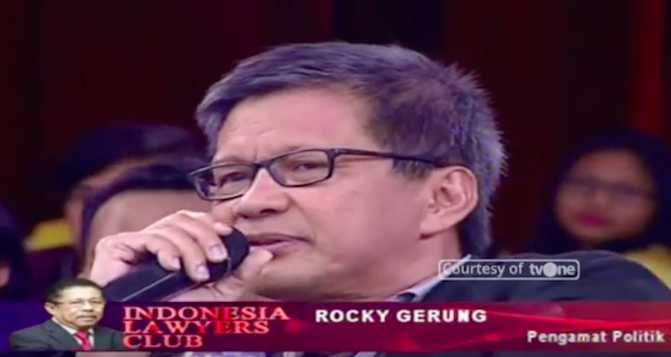Indonesia may have yet another huge blasphemy scandal in the making following last week’s controversy surrounding Sukmawati Soekarnoputri’s poem. This time it involves Rocky Gerung, a lecturer of philosophy at the prestigious Universitas Indonesia (UI).
Recently, government and opposition lawmakers alike have been butting heads publicly on social media, showing what rap battles might look like if they involved middle-aged politicians using rhymes to promote their respective candidates for the 2019 presidential election.
Cut to Tuesday’s edition of tvOne’s popular debate show Indonesia Lawyers Club, in which Gerung defended the politicians’ use of limericks to big up either President Joko Widodo or his likely 2019 competitor Prabowo Subianto, even if the politicians don’t necessarily use facts in their arguments. He argued that fiction is important for stimulating the imagination in political discourse, before going on to illustrate his point with an example that offended many in Indonesia.
“If I use the definition, ‘fiction activates the imagination,’ then holy books are fiction, because they are not yet conclusive. [Some events foretold in the books] have not yet happened,” Gerung said.
Gerung went on to make the distinction between the noun fiksi (fiction) with the adjective fiktif (fictive), which, according to him, hold different meanings, with the former being an imagination stimulant while the latter is associated with lies and deceit.
“If I say, ‘holy books are fictive,’ then tomorrow I’ll be sent to jail. But if I say, ‘holy books are fiction,’ then I have an argument, because I am counting on the eschatology in the holy books,” he said.
Not seeing a difference in the definitions of fiksi and fiktif, Abu Janda, chairman of the social media activism group Cyber Indonesia, on Wednesday evening reported Gerung to the Jakarta Metro Police for suspicion of blasphemy.
“Tonight there are [followers of] three religions, Islam, Christianity, and Buddhism, who were hurt by Rocky Gerung’s statement that holy books are fictional,” Janda said, as quoted by Detik.
Under Indonesian law, blasphemy is punishable by up to five years in prison. Rocky said he is willing to clarify his statement to the police if summoned for questioning.
Janda’s official complaint about Gerung to the police remains the only one so far. Other religious groups, including the Indonesian Ulema Council (MUI) and Persaudaraan Alumni 212 have yet to publicly condemn Gerung for his statement, both choosing to analyze it first and wait for clarification before acting.
This comes in stark contrast to how the MUI immediately issued a fatwa (religious edict) against former Jakarta Governor Basuki “Ahok” Tjahaja Purnama after accusing him of blasphemy when he warned people not to be fooled by politicians who use the Quran as a political tool. That accusation was quickly followed by Islamic hardline groups publicly denouncing Ahok and held mass protests against him.
For its part, the Indonesian Communion of Churches (PGI) has already taken a clear stance on the issue, saying that they don’t believe Gerung committed blasphemy by uttering the controversial statement.




